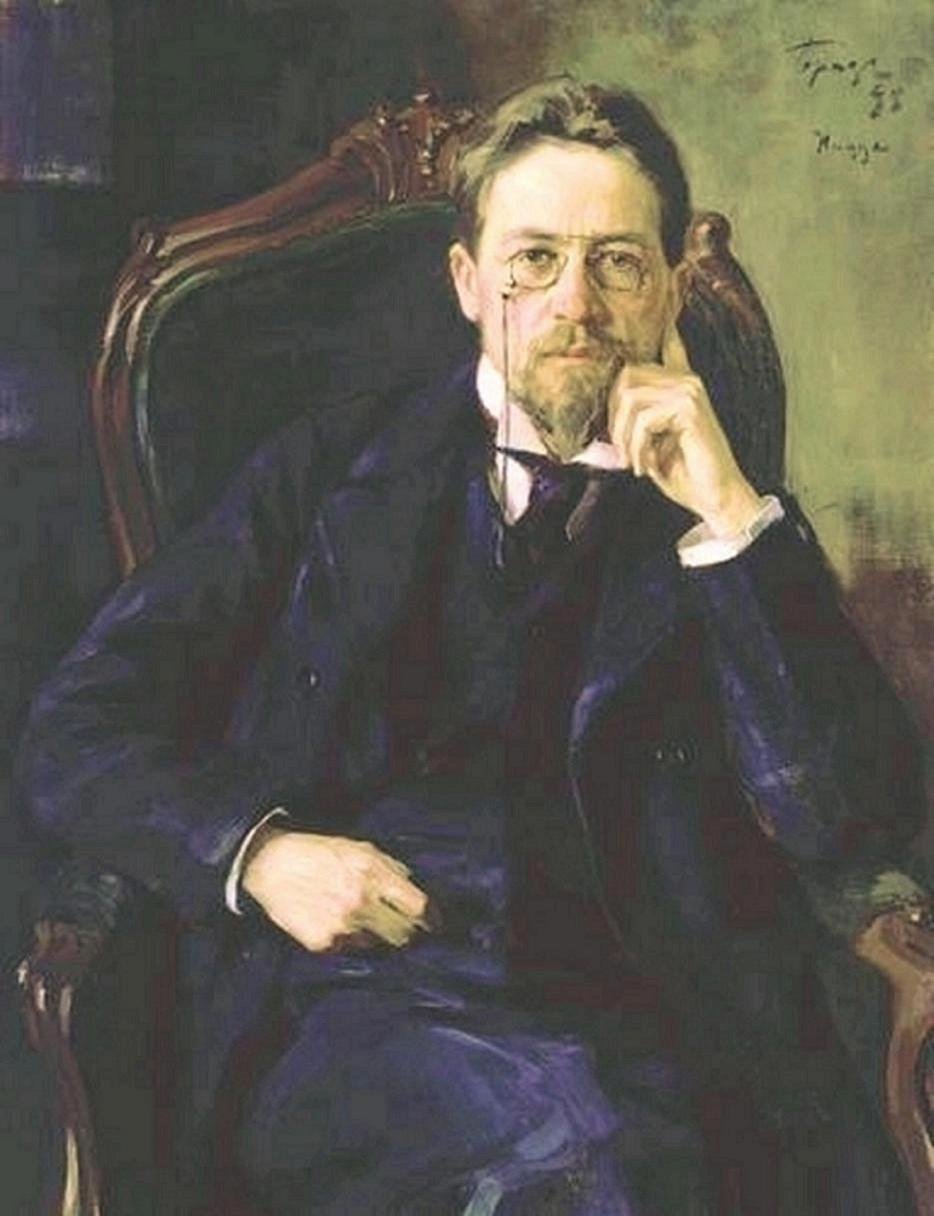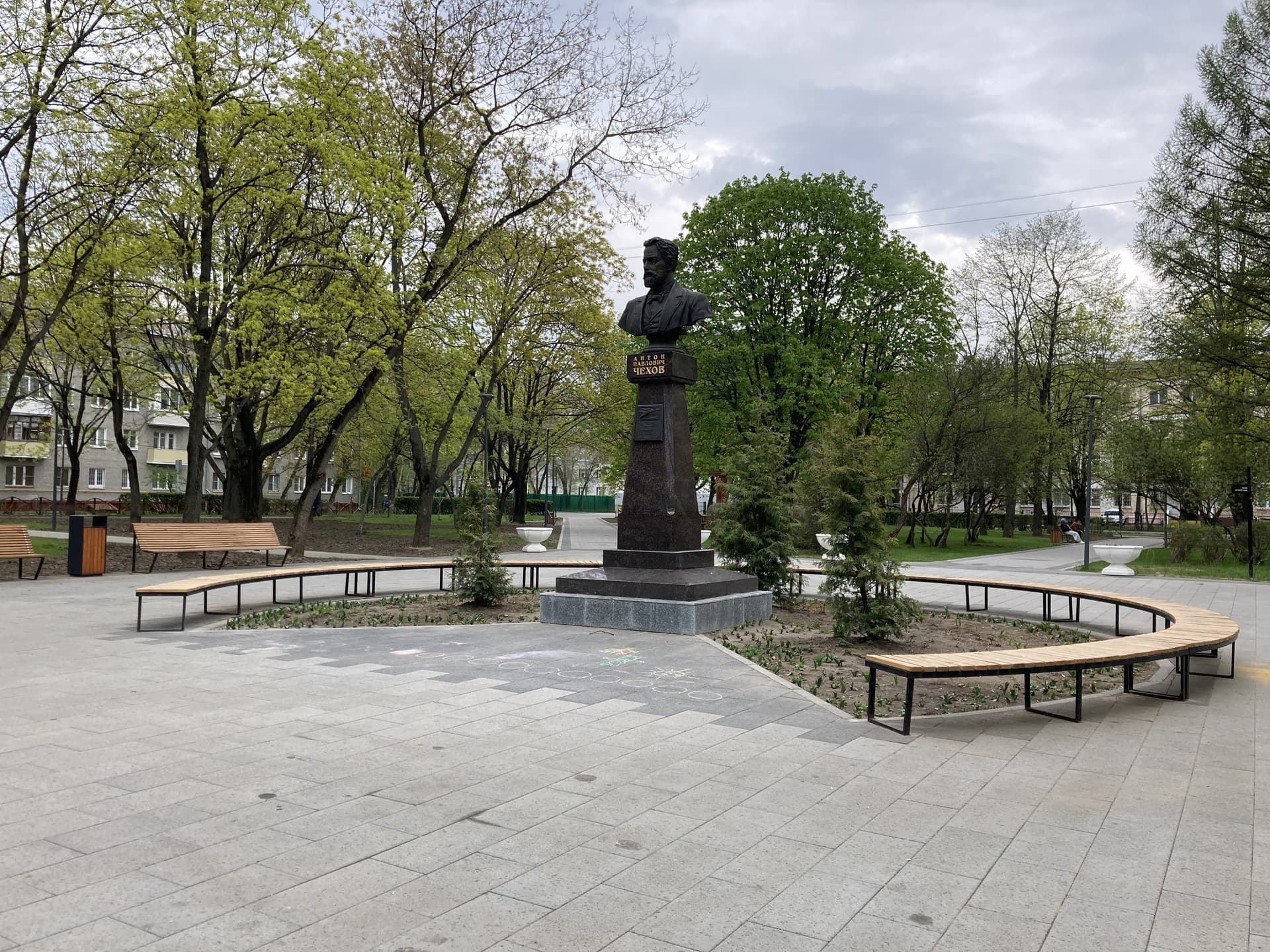Антон Павлович Чехов (17 (29) января 1860 года, Таганрог, Россия – 2 (15) июля 1904 года, Баденквайлер, Германия) – писатель, драматург, врач, почетный академик Императорской Академии наук по разряду изящной словесности.
Родился в религиозной семье отца Павла Егоровича, купца третьей гильдии, и матери Евгении Яковлевны третьим ребенком. Семья была патриархальной, дети воспитывались строго - с применением телесных наказаний, работой в лавке, обязательным участием в церковных службах и пением в церковном хоре в 5 утра. Иногда в семье устраивались музыкальные представления, где пели хором, отец играл на скрипке, дети аккомпанировали на фортепьяно.
23 августа 1868 года поступил в приготовительный класс таганрогской мужской классической гимназии. Во время учебы писал смешные рассказы, издавал юмористические журналы, принимал участие в домашних спектаклях. Антон Чехов впервые побывал в театре в 13 лет и страстно полюбил театр.
В 1879 году Антон Чехов закончил гимназию, переехал в Москву и поступил на медицинский факультет Московского университета. В 1882 году начал работать в Чикинской больнице, куда пришел врачом в 1884 году после окончания университета.
24 декабря 1879 года в журнале «Стрекоза» были напечатаны рассказ «Письмо ученому соседу» и юмореску «Что чаще всего встречается в романах, повестях и т.п.» - это был дебют писателя Антона Чехова.
С этого года Антон Чехов писал в журналы «Будильник», «Зритель», «Осколки», «Стрекоза», в газеты «Новое время», «Русские ведомости», «Петербургская газета» без подписи или под псевдонимом Антоша Чехонте.
В 1884 году вышел сборник рассказов «Сказки Мельпомены» с подписью «А.Чехонте».
7 (19) октября 1888 года он получает половинную Пушкинскую премию Академии наук за сборник «В сумерках» (1887).
В 1890 году Антон Чехов, уже популярный писатель, поехал в путешествие на остров Сахалин и в дороге написал серию очерков «Из Сибири». Там он пробыл несколько месяцев – провел перепись жителей острова, собрав несколько тысяч карточек. Оттуда возвращался на пароходе «Петербург» через Гонконг, Сингапур, остров Цейлон, Константинополь, Одессу.
В течение последующих пяти лет Антон Чехов писал книгу «Остров Сахалин».
В 1890 – 1892 году проживал в двухэтажном флигеле на Малой Дмитровке в Москве.
В 1892 – 1899 годы поселился в имении Мелихово под Москвой. Там было написано 42 произведения. Из-за обострения туберкулеза Антон Чехов переехал под Ялту, редко приезжая в Москву к жене О.Л. Книппер, артистке труппы МХТ.
В 1900 году Антон Чехов был избран в число почетных академиков Пушкинского отделения академии наук. Отказался от этого звания в 1902 году, после распоряжения императора Николая II аннулировать избрание в почетные академики Максима Горького.
В 1904 году поехал на курорт в Германию и скончался там из-за обострения болезни. Писатель Антон Чехов был похоронен на Новодевичьем кладбище.
Anton Pavlovich Chekhov (January 17 (29) 1860, Taganrog, Russia - 2 (15) 1904, Badenkvayler, Germany) - writer, playwright and physician, Honorary Academician of the Imperial Academy of Sciences in the belles-lettres.
He was born into a religious family father Paul Zhukovsky, a merchant of the third guild, and mother Eugenia Jakovlevny being the third child. The family was patriarchal, children were brought up strictly - the use of corporal punishment, the work in the shop, mandatory participation in church services and singing in the church choir at 5am. Sometimes the family arranged musical performances where the choir sang, the father played the violin, children accompanied on the piano.
On August 23, 1868 Chekhov entered the preparatory class Taganrog classic men's gymnasium. During his studies, writing funny stories, published comic magazines, participated in the home performances. Anton Chekhov first visit to the theater when he was 3 and felt in love with theater passionately.
In 1879, Anton Chekhov graduated from high school, he moved to Moscow and entered the Medical Faculty of Moscow University. In 1882 he began working in Chikinskaya hospital, where the doctor came in 1884 after graduating from university.
On December 24, 1879 "Dragonfly" magazine published the story "Letter scientist neighbor" and Humoresque "What is most common in novels, stories, etc." - this was the debut of writer Anton Chekhov.
Starting this year, Anton Chekhov wrote in the journal "Alarm", "spectator", "Fragments," "Dragonfly" in the newspaper "New Era", "Russian Gazette", "St. Petersburg newspaper" unsigned or under a pseudonym Anton Chekhonte.
In 1884 he published a collection of short stories "Tales of Melpomene" signed "A.Chehonte."
On October 7 (19), 1888 he gets half the Pushkin Prize of the Academy of Sciences of the book "In the twilight" (1887).
In 1890, Anton Chekhov, already a popular writer, went on a trip to the island of Sakhalin and the road has written a series of essays "From Siberia". There he stayed for several months - had a census population of the island, collecting several thousand cards. From there, back on the ship "St. Petersburg" by Hong Kong, Singapore, Ceylon, Constantinople, Odessa.
Over the next five years, Anton Chekhov wrote the book "Sakhalin Island".
In 1890 - 1892 were living in a two-story outhouse on Malaya Dmitrovka in Moscow.
In 1892 - 1899 years settled in Melihovo estate near Moscow. 42 of his works were written there. Due to the worsening of tuberculosis Anton Chekhov moved under Yalta, rarely coming to Moscow to visit his wife OL Knipper, the actress troupe of the Moscow Art Theatre.
In 1900, Anton Chekhov was elected to the number of honorary academicians Pushkin Branch of the Academy of Sciences. Refused the title in 1902, after the orders of Emperor Nicholas II to annul the election of honorary academicians Maxim Gorky.
In 1904 went to the resort in Germany and died there due to acute illness. Writer Anton Chekhov buried at Novodevichy Cemetery.







.jpg&w=1920&q=75)





























